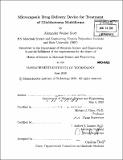Microcapsule drug delivery device for treatment of glioblastoma multiforme
Author(s)
Scott, Alexander Wesley
DownloadFull printable version (7.110Mb)
Other Contributors
Massachusetts Institute of Technology. Dept. of Materials Science and Engineering.
Advisor
Michael J. Cima and Robert S. Langer.
Terms of use
Metadata
Show full item recordAbstract
Controlled-release drug delivery systems are capable of treating debilitating diseases, including cancer. Brain cancer, in particular glioblastoma multiforme (GBM), is an extremely invasive cancer with a dismal prognosis. The use of drugs capable of crossing the blood-brain barrier has shown modest prolongation in patient survival, but not without unsatisfactory systemic, dose-limiting toxicity. Localized delivery of potent chemotherapeutics aims to lower systemic toxicity while increasing drug concentrations directly to the tumor site. I have developed implantable drug delivery microcapsule devices for the localized delivery of temozolomide and for treatment of glioblastoma multiforme in this work. I have been able to modulate the drug release profiles from these microcapsules based on the physical chemistry of the drug and the dimensions of the release orifices in these devices. Experimental in vitro studies were performed in order to test the function, reliability, and drug release kinetics of the devices. The experimental release curves showed mass flow rates of 36 ug/hr for single-orifice devices and an 88 ug/hr mass flow rate for multiple-orifice devices loaded with temozolomide. Intracranial temozolomide-filled microcapsules were tested in a rodent 9L glioma model. Outcomes were animal survival and immunohistochemical analysis of tissue for evidence of DNA strand breaks via terminal deoxynucleotidyl transferase dUTP nick end labeling (TUNEL) assay. Results showed that localized delivery of chemotherapeutics from microcapsule devices is capable of prolonging animal survival and may offer an alternative to the harsh side-effects and low response rates inherent to systemic drug administration in GBM patients.
Description
Thesis (S.M.)--Massachusetts Institute of Technology, Dept. of Materials Science and Engineering, 2010. Includes bibliographical references (p. 87-93).
Date issued
2010Department
Massachusetts Institute of Technology. Department of Materials Science and EngineeringPublisher
Massachusetts Institute of Technology
Keywords
Materials Science and Engineering.